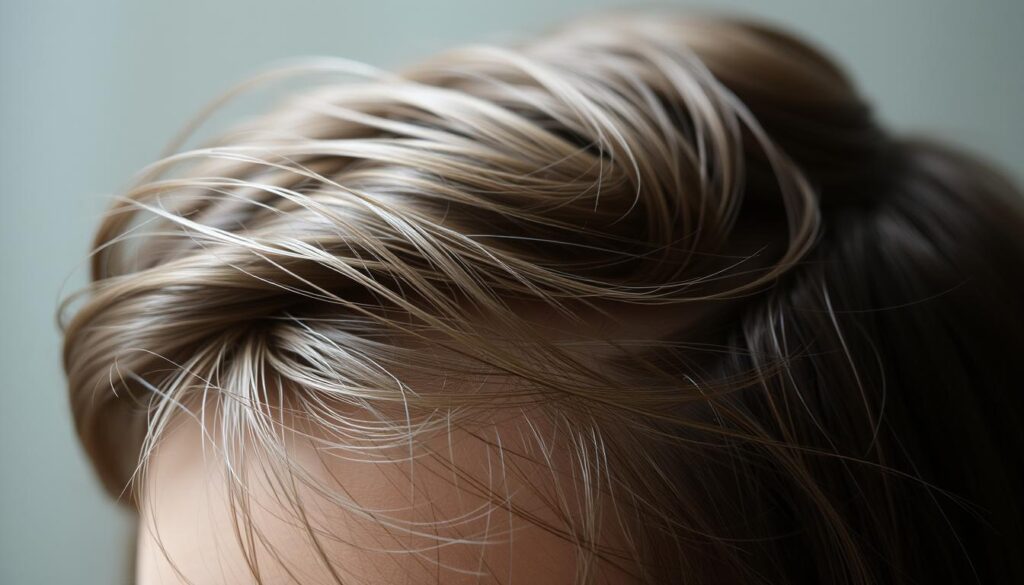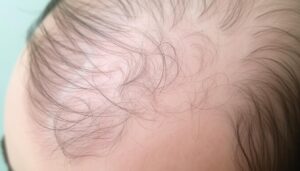Ever had a sore scalp and noticed more hair falling out? You’re not alone. Many people wonder if scalp pain and hair loss are connected. The answer might surprise you.
Exploring the link between these issues could help your scalp and hair. It’s a journey to better scalp health.

Key Takeaways
- Scalp pain and hair loss can be interrelated, with various underlying causes contributing to the connection.
- Sensitive scalps, scalp conditions, and infections may all play a role in triggering or exacerbating hair loss.
- Understanding the root causes of your scalp pain and hair loss is crucial for effective treatment and prevention.
- Certain autoimmune disorders can lead to both scalp tenderness and increased hair shedding.
- Stress and inflammation can contribute to a burning, sensitive scalp and subsequent hair thinning.
Understanding Scalp Pain and Its Causes
Scalp pain can be frustrating and worrying. People often wonder what causes it. It can stem from sensitive skin, scalp conditions, or infections.
Sensitive Scalp
A sensitive scalp feels tingling, itching, or burning. This can lead to hair loss. Many things can make the scalp sensitive, like harsh hair products, environmental irritants, or stress.
Scalp Conditions and Infections
Scalp conditions like seborrheic dermatitis, psoriasis, or ringworm can cause pain and inflammation. These issues can make the scalp red, scaly, and hair shedding happens. This makes the scalp tender and uncomfortable.
| Scalp Condition | Symptoms | Impact on Hair |
|---|---|---|
| Seborrheic Dermatitis | Oily, flaky scalp, redness, and itching | Increased hair loss and thinning |
| Psoriasis | Scaly, inflamed patches on the scalp | Temporary hair loss and thinning |
| Ringworm | Circular, red, itchy patches | Patchy hair loss and breakage |
Does Alopecia Cause Scalp Tenderness?
Alopecia is an autoimmune condition that causes hair loss. It often leads to a tender scalp. The immune system attacking hair follicles can cause inflammation and pain.
People with alopecia may feel different levels of scalp sensitivity. This depends on how severe and advanced the condition is. In this case a sore scalp and hair loss are connected.
Autoimmune Disorders and Scalp Sensitivity
Scalp sensitivity in alopecia comes from its autoimmune nature. When the immune system attacks hair follicles, it causes inflammation. This leads to a tender, irritated scalp.
The sensitivity can vary from mild to severe. It depends on the person and how the alopecia progresses.
Certain alopecia types, like alopecia areata, can cause intense scalp sensitivity. The immune system’s attack can make the scalp burn, itch, or sting. Even light touches or gentle hair care can be uncomfortable.
Tender Scalp and Hair Loss in Women
Women often face a unique challenge with scalp tenderness and hair loss. Hormonal changes, stress, and certain medical conditions play a big role. This makes women more likely to have a tender scalp and thinning hair.
Hormonal imbalances are a key factor in scalp tenderness and hair loss for women. Changes in estrogen, progesterone, and other hormones can cause inflammation and sensitivity. This can lead to female hair loss. Conditions like PCOS and thyroid disorders are common causes.
Stress is another big contributor to scalp tenderness and hair loss in women. Prolonged stress can lead to too much cortisol, a hormone that disrupts hair growth. Stress can also make the scalp more sensitive and uncomfortable.
Conclusion
The link between scalp pain and hair loss is complex. If you are experiencing hair loss, consider scalp micropigmentation. A non-invasive procedure that can make your hair look fuller and help with your hairline.
One of the ways you can be confident in your procedure, is by who you chose to do it. Come visit ScalpMasters, where we will help you every step of the way. Are you ready to start your SMP journey? Contact us today to schedule a consultation.










